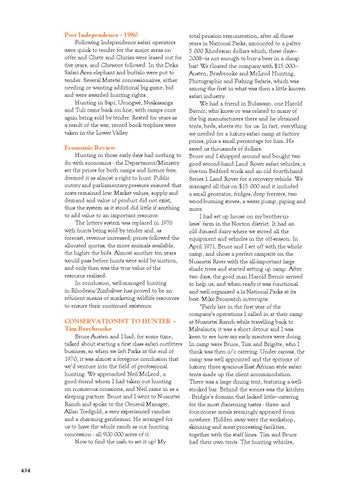Post Independence - 1980 Following Independence safari operators were quick to tender for the major areas on offer and Chete and Chirisa were leased out for five years, and Chewore followed. In the Deka Safari Area elephant and buffalo were put to tender. Several Matetsi concessionaires, either needing or wanting additional big game, bid and were awarded hunting rights. Hunting in Sapi, Urungwe, Nyakasanga and Tuli came back on line, with camps once again being sold by tender. Rested for years as a result of the war, record book trophies were taken in the Lower Valley. Economic Review Hunting in those early days had nothing to do with economics - the Department/Ministry set the prices for both camps and licence fees; deemed it as almost a right to hunt. Public outcry and parliamentary pressure ensured that costs remained low. Market values, supply and demand and value of product did not exist, thus the system as it stood did little if anything to add value to an important resource. The lottery system was replaced in 1976 with hunts being sold by tender and, as forecast, revenue increased; prices followed the allocated quotas; the more animals available, the higher the bids. Almost another ten years would pass before hunts were sold by auction, and only then was the true value of the resource realised. In conclusion, well-managed hunting in Rhodesia/Zimbabwe has proved to be an efficient means of marketing wildlife resources to ensure their continued existence. CONSERVATIONIST TO HUNTER – Tim Braybrooke Bruce Austen and I had, for some time, talked about starting a first class safari outfitters business, so when we left Parks at the end of 1970, it was almost a foregone conclusion that we’d venture into the field of professional hunting. We approached Neil McLeod, a good friend whom I had taken out hunting on numerous occasions, and Neil came in as a sleeping partner. Bruce and I went to Nuanetsi Ranch and spoke to the General Manager, Allan Tredgold, a very experienced rancher and a charming gentleman. He arranged for us to have the whole ranch as our hunting concession - all 900 000 acres of it. Now to find the cash to set it up! My
434
total pension remuneration, after all those years in National Parks, amounted to a paltry 5 000 Rhodesian dollars which, these days— 2008—is not enough to buy a beer in a cheap bar! We floated the company with $15 000— Austen, Braybrooke and McLeod Hunting, Photographic and Fishing Safaris, which was among the first in what was then a little known safari industry. We had a friend in Bulawayo, one Harold Bernic, who knew or was related to many of the big manufacturers there and he obtained tents, beds, sheets etc. for us. In fact, everything we needed for a luxury safari camp at factory prices, plus a small percentage for him. He saved us thousands of dollars. Bruce and I shopped around and bought two good second-hand Land Rover safari vehicles, a five-ton Bedford truck and an old fourth-hand Series 1 Land Rover for a recovery vehicle. We managed all this on $15 000 and it included a small generator, fridges, deep freezers, two wood-burning stoves, a water pump, piping and more. I had set up house on my brother-inlaws’ farm in the Norton district. It had an old disused dairy where we stored all the equipment and vehicles in the off-season. In April 1971, Bruce and I set off with the whole camp, and chose a perfect campsite on the Nuanetsi River with the all-important large shade trees and started setting up camp. After two days, the good man Harold Bernic arrived to help us, and when ready it was functional and well organised a la National Parks at its best. Mike Bromwich interrupts: “Fairly late in the first year of the company’s operations I called in at their camp at Nuanetsi Ranch while travelling back to Mabalauta; it was a short detour and I was keen to see how my early mentors were doing. In camp were Bruce, Tim and Brigitte, who I think was then o/c catering. Under canvas, the camp was well appointed and the epitome of luxury; three spacious East African style safari tents made up the client accommodation. There was a large dining tent, featuring a wellstocked bar. Behind the scenes was the kitchen - Bridgie’s domain that lacked little—catering for the most discerning tastes - three- and four-course meals seemingly appeared from nowhere. Hidden away were the workshop, skinning and meat processing facilities, together with the staff lines. Tim and Bruce had their own tents. The hunting vehicles,
